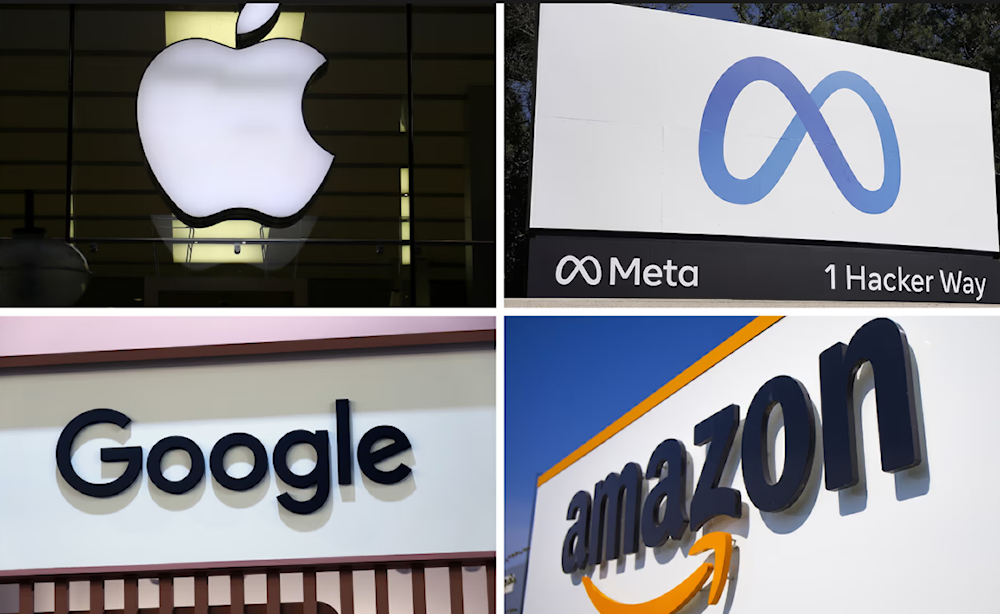'Silicon six’ accused of dodging $278 bln in US taxes over 10 years
The "Silicon Six" — Amazon, Meta, Alphabet, Netflix, Apple, and Microsoft — are accused of avoiding $278bn in taxes over a decade, as scrutiny over Big Tech’s global tax practices intensifies.
-
 A collage featuring the logos of four of US tech giants Apple; Meta; Google; and, Amazon. (AP)
A collage featuring the logos of four of US tech giants Apple; Meta; Google; and, Amazon. (AP)
Major US tech giants, dubbed the "Silicon Six," are accused of paying nearly $278bn less in corporate income taxes over the past decade than what similar-profit US companies would owe under standard tax rates.
Amazon, Meta, Alphabet, Netflix, Apple, and Microsoft generated $11tn of revenue and $2.5tn of profits over the past 10 years.
According to the Fair Tax Foundation (FTF), the “Silicon Six” paid an average of just 18.8% in combined national and federal corporate taxes over the past decade, well below the 29.7% US average. When excluding one-off repatriation tax payments tied to past tax avoidance, their average rate drops even further to 16.1%, with the FTF claiming the firms have “hardwired” tax avoidance into their business models.
The report also claimed the companies overstated their tax payments by $82bn during the same period by including provisions for taxes they likely wouldn’t have to pay.
Paul Monaghan, chief executive of the FTF, said, “Our analysis would indicate that tax avoidance continues to be hardwired into corporate structures. The Silicon Six’s corporate income tax contributions are, in percentage terms, way below what sectors such as banking and energy are paying in many parts of the world.”
He highlighted the use of “aggressive tax practices” like contingency tax positions and noted that the companies wield “enormous political influence as well as economic power,” spending millions on lobbying efforts.
Global tax practices under scrutiny
The report comes at a time when the influence of major US tech companies is under the spotlight, highlighted by the attendance of their CEOs, Amazon’s Jeff Bezos, Apple’s Tim Cook, and Meta’s Mark Zuckerberg, at Donald Trump’s second inauguration.
A significant tax cut for such companies has reportedly been at the heart of discussions with the UK in its attempts to secure lower tariffs on its products exported to the US.
Monaghan explained that a large portion of the Silicon Six’s overseas revenue benefited from low US corporate tax rates due to a break for foreign-derived intangible income. The FTF added that these companies also paid less tax on overseas sales by combining low profit margins with the practice of booking profits in low-tax jurisdictions.
Netflix paid the lowest effective tax rate relative to its reported profits, at 14.7%, while Microsoft paid 20.4%. According to the FTF, Amazon had the poorest tax conduct, citing factors like the overall tax paid and “obvious profit shifting,” including routing a significant share of its UK income through low-tax Luxembourg. Despite this, Amazon’s corporate tax rate stood at 19.6%, higher than those of Netflix, Meta (15.4%), and Apple (18.4%).
Tech firms defend tax practices
An Amazon spokesperson said the company’s UK retail revenues, along with related expenses, profits, and taxes, are all recorded in the UK and reported directly to HM Revenue and Customs.
The spokesperson said, “Governments write the tax laws and Amazon is doing the very thing these laws encourage companies to do – paying all taxes due while also investing billions in creating jobs and infrastructure. Since 2010, we have invested more than $1.2tn in the US and over €250bn [£215bn] in Europe. Coupled with low margins, this investment will naturally result in a lower cash tax rate, particularly when measured as a percentage of revenue.”
A spokesperson for Meta said, “We follow international and local tax rules, ensuring that we pay all taxes required in each of the countries where we operate.”
Meta, however, is pushing the US to oppose an EU ruling that could force it to offer ad-free versions of Facebook and Instagram, threatening its core source of revenue, according to the Wall Street Journal.
A Netflix spokesperson said, “Governments determine tax rules and rates, and companies comply with them. Netflix complies with the relevant tax rules and regulations in every country in which we operate.”
In 2022, a majority of Swiss voters approved a "Netflix Tax" in a referendum, requiring streaming services like Netflix to allocate 4% of their annual revenue to support the Swiss film industry.

 4 Min Read
4 Min Read








